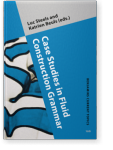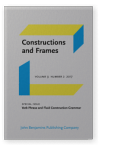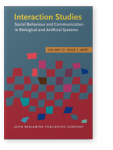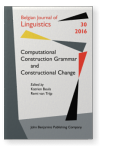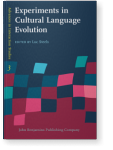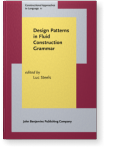Michael Spranger
List of John Benjamins publications for which Michael Spranger plays a role.
2019 Russian verbs of motion and their aspectual partners in Fluid Construction Grammar Case Studies in Fluid Construction Grammar: The verb phrase, Steels, Luc and Katrien Beuls (eds.), pp. 129–148 | Chapter
Russian boasts a highly complex aspectual system which can appear irregular and
difficult to learn. It has recently been suggested that motion verbs, which are
normally seen as exceptional in their nature, may in fact be at the core of this
system, motivating aspectual behavior based on stem… read more
2017 Russian verbs of motion and their aspectual partners in Fluid Construction Grammar Verb Phrase and Fluid Construction Grammar, Steels, Luc and Katrien Beuls (eds.), pp. 302–320 | Article
Russian boasts a highly complex aspectual system which can appear irregular and difficult to learn. It has recently been suggested that motion verbs, which are normally seen as exceptional in their nature, may in fact be at the core of this system, motivating aspectual behavior based on stem… read more
2016 A boy named Sue: The semiotic dynamics of naming and identity Computational Construction Grammar and Constructional Change, Beuls, Katrien and Remi van Trijp (eds.), pp. 147–169 | Article
One major lesson learned in the cognitive sciences is that even basic human cognitive capacities are extraordinarily complicated and elusive to mechanistic explanations. This is definitely the case for naming and identity. Nothing seems simpler than using a proper name to refer to a unique… read more
2012 A language strategy for aspect: Encoding Aktionsarten through morphology Experiments in Cultural Language Evolution, Steels, Luc (ed.), pp. 257–276 | Article
This chapter explores a possible language strategy for verbalizing
aspect: the encoding of Aktionsarten by means of morphological markers.
Russian tense-aspect system is used as a model. We first operationalize
this system and reconstruct the learning operators needed for acquiring
it. Then we… read more
2012 The co-evolution of basic spatial terms and categories Experiments in Cultural Language Evolution, Steels, Luc (ed.), pp. 111–141 | Article
This chapter studies how basic spatial categories such as left-right, front-back, far-near or north-south
can emerge in a population of robotic agents in co-evolution with terms that express these categories. It introduces
various language strategies and tests them first in reconstructions of… read more
2012 Emergent functional grammar for space Experiments in Cultural Language Evolution, Steels, Luc (ed.), pp. 207–232 | Article
This chapter explores a semantics-oriented approach to the origins of syntactic structure.
It reports on preliminary experiments whereby speakers introduce hierarchical constructions and
grammatical markers to express which
conceptualization strategy hearers are supposed to invoke. This… read more
2012 Emergent mirror systems for body language Experiments in Cultural Language Evolution, Steels, Luc (ed.), pp. 87–109 | Article
This chapter investigates how a vocabulary for talking about
body actions can emerge in a population of
grounded autonomous agents instantiated as humanoid robots.
The agents play a Posture Game in which the speaker asks
the hearer to take on a certain posture. The speaker either
signals… read more
2011 Syntactic indeterminacy and semantic ambiguity: A case study for German spatial phrases Design Patterns in Fluid Construction Grammar, Steels, Luc (ed.), pp. 265–298 | Article
This chapter presents an operational grammar for German spatial language, in particular German locative phrases, as a case study for processing distributed information. It investigates the complex interplay of syntactic phenomena and spatial semantics, with a specific emphasis on efficient… read more
